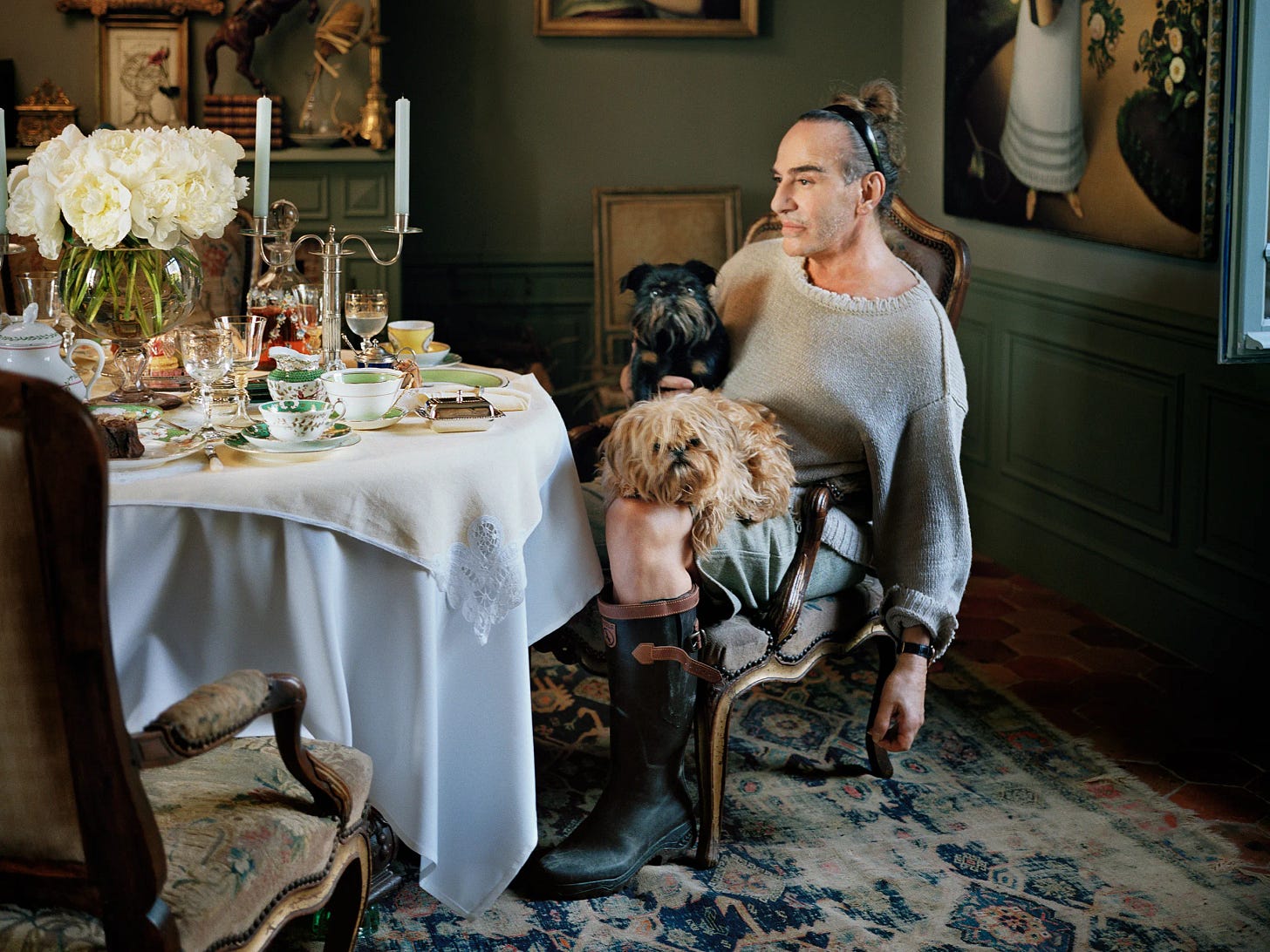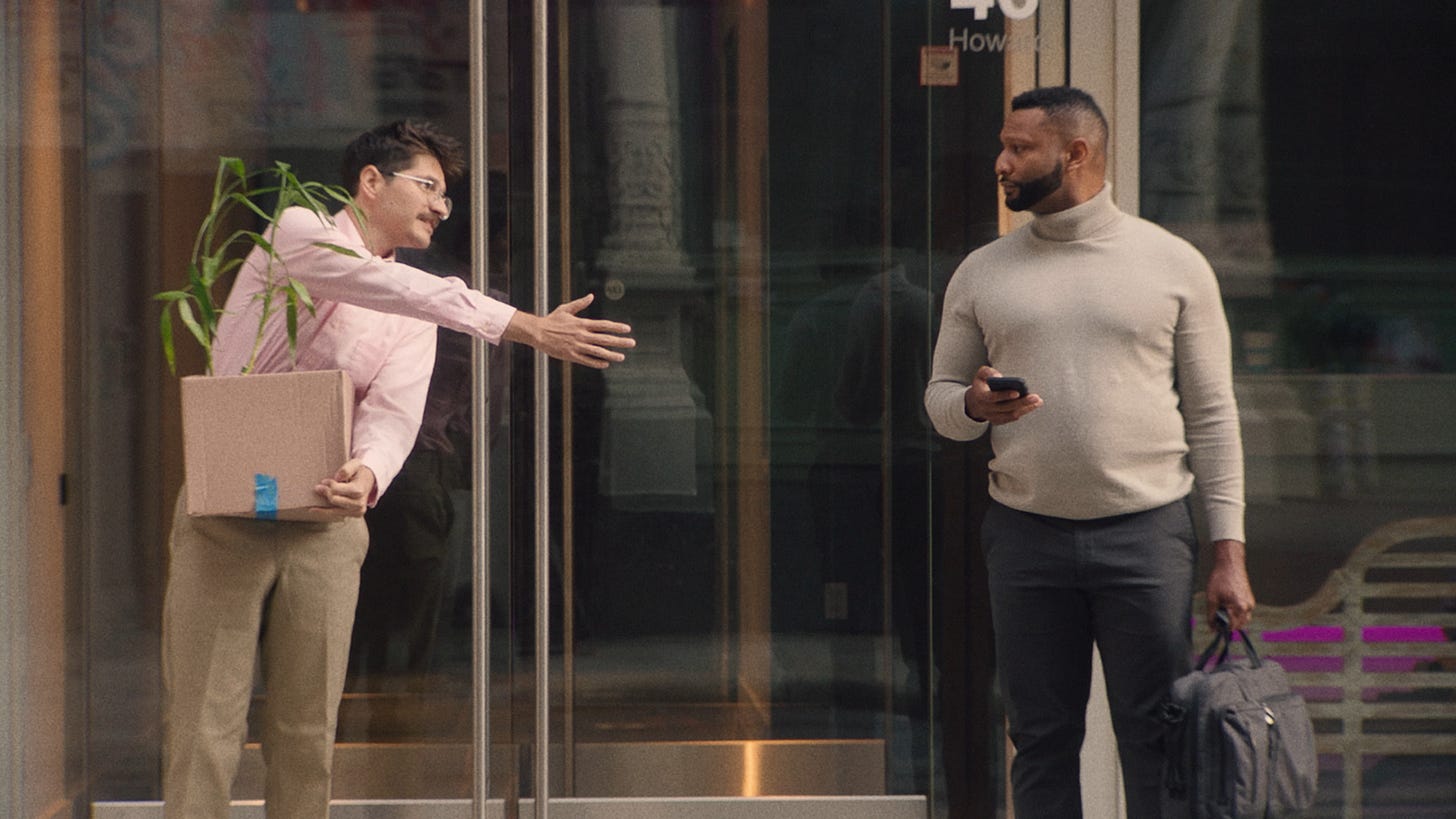New movies, new restaurants
Free Time, the John Galliano doc, and Radu Jude's latest. Plus exemplary Uyghur noodles.
HIGH & LOW - JOHN GALLIANO
John Galliano’s bombastic personality makes for primo material in this new documentary, which sets out to inform, contextualize, and reappraise the once-canceled fashion designer. Rather than court our instinctive forgiveness, filmmaker Kevin Macdonald strives to make us understand if not empathize with its subject instead.
Before offering Galliano a mea culpa platform, the film serves the uninitiated a primer to his career, which ascended too quickly before imploding like a red giant. Did you know for instance, that the l'enfant terrible, born in Gibraltar and a graduate of the unparalleled Central Saint Martins, was the first Englishman to head a French couture house when he was appointed to Givenchy in 1995? Or that he, as the film leads us to believe, energized the runway show, impelling it from stodgy look-see to boldly creative showcase (before it eventually reached unsustainable and gimmicky heights of showmanship)? Or that he was largely responsible for those satiny silk dresses, cut on the bias, so as better to slink around in? I for one did not.
But I do vaguely remember his series of antisemitic outbursts on a public cafe patio in the early 2010s, for which he was fined and then essentially fired.
High & Low strategically dissects his persona, attempting to parse the art from the artist, while contextualizing the situation: namely the toxic glamor of the fashion industry, the relentless pull of which led him to produce an astonishing 30+ collections a year and develop/exacerbate a drug habit. The movie’s showy subject is match by its visuals, interweaving a treasure trove runway footage and old film clips, lots of Abel Gance’s Napoleon plus the The Red Shoes, works alluding to dazzlement, beauty, and power. The documentary’s usual talking head structure is also greatly enlivened by Galliano himself who a natural born performer. As the film unfolds film, you grapple not just with Galliano’s sins but whether he’s atoned enough for them—and if he’s really means it. Kate, Naomi, and Anna all candidly speak in his favor, which Macdonald balances with sober testimony from one of victims of Galliano’s tirade. The Conde Naste “reveal” at the end is meant to act an objective disclosure but have more of the opposite effect. In the end, some may believe the designer, while others will remain skeptical. and some others will continue to wonder at the multitudes we all hold. And there lies the crux of why this film works.
FREE TIME
A satirical portrait of disaffected youth, Ryan Martin Brown’s concise almost unbearably hilarious film is small in scale but suggestive of something larger in spirit as it dramatizes the Millennial Resignation and elevates it into fable. Twenty-something Brooklynite Drew (Colin Burgess) works a nondescript office job and rather than engage in any so-called quiet-quitting, impulsively axes himself in front of his manager through an impressively derailed chain of logic. With ample time to pursue his dreams and get down to living, he wanders the city alone—because, you know, everyone else still has to work—propelled by the breeze of NYC summer, the low-key mood underscored by a jaunty piano score. Drew goes to happy hour, band practice, parties; contends with the consumption of one too many edibles and his roommate and girlfriend (Rajat Suresh and Holmes, both very funny). But the novelty of an empty afternoon grows stale as Drew, in an ironic twist of fate, wants for his old job.
There’s something palpably out of place about Drew and by association Burgess. With his toothbrush mustache and wire frames, he seems of another era, and not in the way of nostalgic Brooklyn archetypes that have come to bear over the years ( Normcore Dads, Bearded Mixologists, and Lumberjack Woodworkers). Less ironic and contrived, Burgess’s persona is shot through with a delightfully earnest lack of awareness, made possible by the comedic performer’s magnificent restraint, ultimately landing Drew in the territory of Mr. Hulot in Playtime or Walter Matthau in A New Leaf. The scenes at band practice where Drew/Burgess sticks out in more ways than one are a key example. Martin Brown keeps the mood light and breezy, before something inspired materializes in the last twenty minutes of the film that is best left unspoiled.
DO NOT EXPECT TOO MUCH FROM THE END OF THE WORLD
Romanian auteur Radu Jude’s withering new film also delves into the state of work today, here how soulless capitalism exploits all parties involved. Also very funny, albeit in a completely different way, Jude's artistic assault is captivating interplay of opposites, combining high and low into a lyrical (and, yes, Godardian) collage that can feel atmospherically quiet but is thematically verbose. He is what you might deem a thoughtful edgelord, whose provocations are backed by a torrent of ideas and intellectual heft, pulling from disparate sources like poetry, theory, old films, new media, and Bob Dylan.
Angela (Ilinca Manolache), a production assistant for an advertising firm, wakes up at the ass crack of dawn and drives endlessly around Bucharest auditioning injured factory workers for a corporate safety training video commissioned by a German/Austrian conglomerate—a sly endeavor for the bosses to wash their hands of blame. Her travails are interwoven with those of another Angela from a 1981 Romaniian film Angela Goes On. Jude winds down parts of the playback to an ominous crawl, zooming in (literally) on marginalized figures, capturing details of a poverty-stricken existence at odds with cheerful on-screen action, vaguely that of a romantic comedy. This juxtaposition connects Romania's past and present; highlighting the ills of the nation today that maybe isn’t so different than the conditions under Ceaușescu’s dictatorship. Inspired by the true story of an overworked PA who died in an accident, the film offers a new way of looking at the car as prison, subverting the potential adventures and freedom of the open road, which have been replaced by an eternal journey on the highway of neoliberal society’s failings.
There’s another texture to the film, more boisterous and forthrightly menacing. In the scarce minutes walking from car to audition, Angela films TikToks as a fictional Bobita, an Andrew Tate-esque misogynist who spews invectives about everyone from Muriel Sparks to the Queen of England. The crude filter, which imperfectly imposing a manical unibrow onto her forehead, accentuates the unsettling aesthetic. After hearing about this film for months and months, I found Bobita’s misgivings less vulgar than proclaimed, though the actualities of dialogue are apparently and inevitably much bawdier in Romanian compared to what you get from the subtitled translation. Jude has expressed his intentions with this film to provoke reflection rather than say direct action, and his movie certainly achieves that.
Sneezing through the swirling descent of pollen, and with absolute disregard for the eclipse, I made my third visit to Laghman Express. The small eatery, which opened last year, deservedly made The New York Times 100 best restaurant list, which feels mostly right but also very rote. You should absolutely make the trek. More details below.
Laghman Express
One of life’s myriad pleasures is stumbling upon a delicious new-to-me food, and lo and behold, this is it. Handpulled noodles are snugly gripped by peppery tomatoes, darkened from caramelization, and impossibly QQ— springy, in expert parlance. Forget everything you know about stir fry. Kissed with wok breath, smokey and singed with the shy scent of cumin, these are dry fried noodles are covetable in the extreme.








